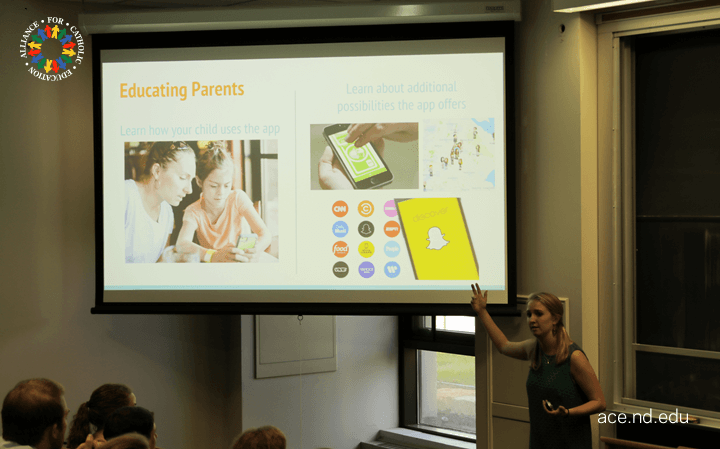Members of ACE 24 showed off their capstone projects July 17 as they presented during the 4th annual ACE Teaching Fellows Conference in DeBartolo Hall. Twenty-two teams spoke about topics such as identity formation in the digital age and cultivating friendships in the classroom as part of their Development and Moral Education in Childhood and Adolescence class.
"Life's a garden. Go dig it." Liam Driscoll shared an example of potential projects teachers could use in their elementary classrooms to teach social justice. Through project based learning, his group argued, students can learn Catholic Social Teaching (CST) in meaningful and long-lasting ways. Driscoll, Alex McKee, Kathleen Harrington, and Daniel Hernandez stressed the importance of making these activities intentional and relevant to students and their communities in their presentation You down with CST?

Kate Hardiman, Maddie Felts, Tim Pingel, and Francis Karczewski presented Finstas and Filters: Identity Formation in the Digital Age. Kate described how the role of students has changed from being primarily consumers to being their own cultural producers. With few barriers to entry, teachers can help guide students positively in the digital age.

A group of elementary school teachers motivated their audience to use book choice and other strategies to make reading fun. KJ Witty, Jackie Winsch, Michael O'Callahan, and Arlyn Barlaan presented, "But I don't like to read!": Pushing Reluctant Readers Past Captain Underpants. Here, KJ led the audience through a scenario working with an unenthusiastic reader.

"Classroom activities and lessons have to be designed with learning as the first priority and clear goal–not the sole use of technology." Anna Busse, Cesar Elvir, Kara Gasparrini, and Samuel Jezak talked about using technology for the right reasons in the classroom. They stressed the importance of intentional technology use in their presentation Walking the Tech Tightrope.

"What is code-switching?" asked Daniel Hodge in his group's presentation "Talking White:" Dismantling Stereotype Threat in Catholic Schools. Daniel, Eric Adej-Danquah, Allison Griffith, and Erin McNally discussed how language has been used to assimilate minority groups since colonial times in America. Their group focused on the power of language and how teachers need to teach students situational awareness for formal and informal types of language in the classroom. Eric emphasized the power of language and how important it is for ENL learners to maintain use of their first language.

In the evolving world of social media, Halie Barrigan, Ariel Navotas, Philip Evans, and Anna Krieg identified potential issues in peer interactions that arise from apps such as Snapchats. Halie offered helpful solutions that teachers can do to educate students and parents on how to use apps like Snapchat in a healthy way that forms positive relationships. Their presentation Left on Read: How Snapchat is Shaping Peer Interactions in Adolescence challenged the audience to be proactive on the digital landscape for their students.

Click to learn more about ACE Teaching Fellows.
 Alliance for Catholic Education
Alliance for Catholic Education
